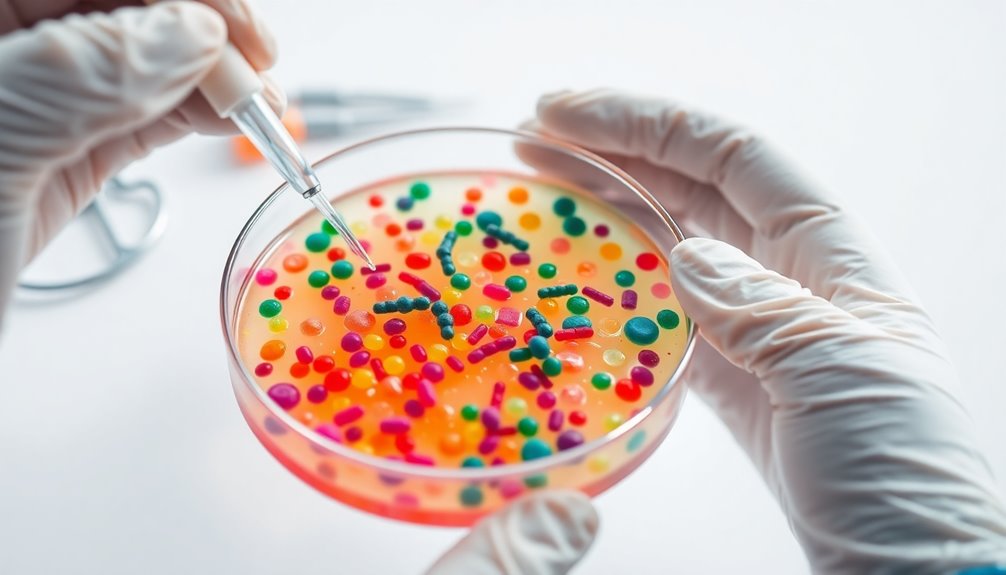You can contract chlamydia without having sex, although it primarily spreads through sexual contact. Infected fluids are the main way the bacteria transmits. Sharing unwashed sex toys is a significant risk, as is direct contact with contaminated items like towels or clothing. Chlamydia doesn't survive long outside the body, but it can still be spread through mucous membranes. It's crucial to take into account these non-sexual transmission paths to understand the infection better. If you're curious about the implications, symptoms, and ways to prevent chlamydia, there's plenty more to explore on the topic.
Key Takeaways
- Chlamydia primarily spreads through sexual contact, but can also be transmitted via infected fluids on contaminated items.
- Sharing unwashed sex toys poses a significant risk for chlamydia transmission.
- Casual contact, like hugging or kissing, does not transmit chlamydia.
- Pregnant women can pass chlamydia to newborns during childbirth, indicating a non-sexual transmission route.
- Asymptomatic carriers can unknowingly spread the infection through non-sexual means, emphasizing the need for awareness.
Understanding Chlamydia Transmission

When it comes to understanding chlamydia transmission, it's crucial to recognize that this infection spreads primarily through sexual contact.
Chlamydia is transmitted during vaginal, anal, and oral sex, where infected fluids come into play. Even if you're not engaging in intercourse, sharing sex toys with someone who's infected can pose a significant risk.
While chlamydia can't survive long outside the body, contaminated items like unwashed sex toys can still lead to transmission.
It's also noteworthy to mention that casual contact, like hugging or kissing, doesn't transmit chlamydia.
To protect yourself, focus on avoiding direct exposure to infected fluids and make sure you're aware of your partner's sexual health status.
Non-Sexual Ways to Contract Chlamydia

You might be surprised to learn that chlamydia can be contracted in ways that don't involve sexual intercourse.
Sharing infected sex toys or coming into direct contact with infected fluids can put you at risk.
Additionally, pregnant women can pass the infection to their newborns during childbirth, highlighting another non-sexual transmission route.
Sharing Infected Sex Toys
How can sharing infected sex toys lead to the transmission of chlamydia?
When you share sex toys that have come into contact with infected fluids, you increase the risk of spreading chlamydia.
The bacteria *Chlamydia trachomatis* can survive on these toys if they aren't cleaned properly, making it easy for transmission to occur through direct contact with your genital area or mucous membranes.
- Always use condoms on sex toys.
- Clean toys thoroughly after each use with soap and water or disinfectants.
- Avoid sharing sex toys whenever possible.
- Educate partners about safe practices.
Vertical Transmission During Birth
Although often associated with sexual transmission, chlamydia can also be passed from an infected mother to her baby during childbirth, a process known as vertical transmission.
If you're a pregnant individual with untreated chlamydia, there's a significant risk your infant could face serious health complications. Studies show that about 50% of infants born to untreated mothers may develop infections, such as pneumonia or conjunctivitis.
To prevent these risks, screening for chlamydia during your first prenatal visit is essential. Regular STI testing and early intervention can safeguard your baby's health and guarantee a healthier pregnancy.
Direct Contact With Fluids
Chlamydia can be transmitted through direct contact with infected bodily fluids, making it possible to contract the infection in non-sexual ways. Here are some key points to reflect upon:
- Infected fluids can contact mucous membranes, like those in the eyes or genitals.
- Sharing unclean sex toys can transmit chlamydia without sexual intercourse.
- Rarely, chlamydia can spread in moist environments through infected fluid.
- Pregnant women can pass the infection to their newborns during childbirth.
While casual contact, like kissing or sharing food, doesn't transmit chlamydia, specific conditions must be met for the infection to spread.
Always be cautious about potential contact with infected fluids to help prevent the transmission of this sexually transmitted infection.
Risk Factors for Chlamydia

When it comes to chlamydia, understanding the risk factors is essential for protecting yourself.
Asymptomatic carriers can unknowingly spread the infection, and sharing sex toys can also pose a risk.
Additionally, certain groups, like individuals under 25 and men who've sex with men, face higher chances of contracting this infection.
Asymptomatic Carriers' Role
Many people infected with chlamydia don't show symptoms, which makes them unwitting transmitters of the disease. Asymptomatic carriers can unknowingly transmit the infection, putting others at risk.
- Approximately 50-70% of chlamydia cases are asymptomatic
- Individuals under 25 with multiple partners are particularly vulnerable
- Men who've sex with men (MSM) and non-Hispanic Black populations experience higher rates
- Regular screenings are essential for sexually active individuals in high-risk groups
Without regular screenings, an infected person may remain unaware of their status, allowing chlamydia infections to spread.
It's vital to prioritize testing, especially in high-risk demographics, to help control this silent epidemic and prevent further transmission.
Non-Sexual Transmission Risks
While sexual contact is the primary mode of chlamydia transmission, there are non-sexual risks that individuals should be aware of. Infected bodily fluids can lead to transmission through contact with mucous membranes, such as in the eyes, though this is rare. A significant risk arises from sharing personal items or sex toys with an infected person. Vertical transmission can also occur when an infected mother passes chlamydia to her newborn during childbirth. Practicing good hygiene and avoiding sharing towels or undergarments can help mitigate these risks.
| Risk Factor | Description |
|---|---|
| Sharing Sex Toys | Can transmit infected bodily fluids |
| Contaminated Fluids | Contact with mucous membranes |
| Personal Items | Avoid sharing towels and undergarments |
High-Risk Populations Identified
Chlamydia is particularly prevalent among certain high-risk populations, with individuals under 25 facing the highest rates of infection. Here are key groups to be aware of:
- Sexually active young adults
- Men who've sex with men (MSM)
- Pregnant individuals
- Non-Hispanic Black populations
These high-risk populations often engage in unprotected sex, increasing their chances of contracting the infection. Asymptomatic carriers can unknowingly spread chlamydia, making awareness essential.
Additionally, healthcare disparities can hinder access to education on safe sex practices, especially among marginalized groups. For pregnant individuals, the risks are even higher, as chlamydia can lead to pregnancy complications and affect newborns.
Staying informed and practicing safe sex is critical to reduce these risks.
Symptoms of Chlamydia

Although chlamydia often goes unnoticed, when symptoms do appear, they can be quite uncomfortable. You might experience abnormal discharge from the genital areas or a burning sensation during urination.
Women may also face pelvic pain, along with bleeding between periods or after sex, indicating a chlamydia infection. Men typically experience clear discharge from the penis, along with potential testicular swelling and rectal pain if the infection spreads to that area.
Ignoring these symptoms can lead to serious health complications, including infertility and pelvic inflammatory disease. That's why it's crucial to stay proactive about your sexual health and get tested for chlamydia regularly, even if you don't notice any symptoms.
Diagnosis and Testing Procedures

Recognizing the symptoms of chlamydia is the first step, but getting a proper diagnosis is vital to effective treatment.
- Routine screenings are essential for sexually active individuals.
- Testing can identify asymptomatic infections before complications arise.
- Pregnant individuals should have a chlamydia test during their first prenatal visit.
- Confidential testing is available at various healthcare facilities.
Diagnosis typically involves laboratory testing, using urine samples or swabs from the cervix, urethra, or throat.
Regular testing helps catch sexually transmitted infections early, especially for those with multiple partners or high-risk behaviors.
Treatment Options for Chlamydia

When it comes to treating chlamydia, antibiotics are the most effective option, typically involving azithromycin or doxycycline. These treatments can clear the infection within 1-2 weeks. It's vital that you and your sexual partners receive treatment simultaneously to prevent reinfection. Follow-up testing is recommended about three months after treatment to confirm the infection has been fully cleared.
| Treatment | Key Points |
|---|---|
| Azithromycin | Single dose, quick treatment |
| Doxycycline | 7-day course, may cause side effects |
| Side Effects | Nausea, diarrhea, mild |
| Importance | Prevent complications, complete treatment |
Adhering to the full course is essential; incomplete treatment can lead to complications and persistent infection.
Prevention Strategies

To effectively prevent chlamydia transmission, it's essential to adopt a combination of practices that promote sexual health.
Here are some strategies you can implement:
- Use condoms consistently and correctly during all sexual activities.
- Get tested regularly, especially if you're under 25 or have multiple partners.
- Avoid sharing sex toys, and make sure they're properly cleaned before use.
- Maintain open communication with your partners about health status and testing.
Long-Term Health Implications

Untreated chlamydia can lead to serious long-term health implications that you mightn't initially associate with the infection.
In women, it can cause Pelvic Inflammatory Disease (PID), resulting in chronic pain and infertility for 10-15% of those affected.
Men can experience complications like epididymitis, which leads to painful swelling and potential infertility if untreated.
If you're pregnant, untreated chlamydia raises the risk of pre-term delivery and neonatal infections in your newborn.
Additionally, the inflammation from the infection compromises your immune system, increasing your risk of contracting HIV.
Long-term, you might also face reactive arthritis, a painful condition impacting your joints, eyes, and urethra.
Prioritizing treatment is essential to avoid these serious health outcomes.
Frequently Asked Questions
Can Chlamydia Be Transmitted Non Sexually?
Chlamydia primarily spreads through sexual contact, but non-sexual transmission is rare.
You can potentially get it from sharing sex toys if they're not cleaned properly, or during childbirth if an infected mother passes it to her newborn.
Casual contact, like hugging or kissing, won't transmit the infection.
While there's a slight chance of indirect transmission through contaminated hands, it's uncommon due to the bacteria's inability to survive long outside the body.
How Did I Get Chlamydia if My Partner Is Clean?
You might feel like a puzzle missing a piece when you wonder how you got chlamydia if your partner seems clean.
Remember, they could be an asymptomatic carrier, unknowingly passing the infection to you. It's also possible you picked it up from previous encounters or shared items.
Chlamydia can hide in the shadows, so regular testing is essential to uncover the truth.
Don't let uncertainty linger; knowledge is your best ally.
How Did I Get Chlamydia if No One Cheated?
You might wonder how you got chlamydia if you think no one cheated.
Remember, the infection can spread through sharing sex toys or contact with infected fluids, even without intercourse.
Asymptomatic individuals can unknowingly transmit the bacteria, so your partner mightn't be aware they're infected.
Additionally, if you're pregnant, there's a chance of passing the infection to your newborn during childbirth.
Understanding these factors can help clarify how the infection spread.
How Long Can You Have Chlamydia Without Sex?
You might find it surprising, but chlamydia can linger in your body for years without showing any symptoms.
In fact, many people carry it unknowingly for a long time. This bacterium can stay dormant, and you won't even realize it's there.
If you don't get tested regularly, you could be harboring an infection that could reactivate later.
Conclusion
So, can you really get chlamydia without having sex? While it's rare, there are non-sexual ways to contract it, like from contaminated surfaces. Imagine touching something infected and then unknowingly spreading it. The risk factors and symptoms can creep up on you, making regular testing essential. You wouldn't want to face the long-term health implications alone. Stay informed, take preventive steps, and guarantee your health remains a priority—because knowledge is your best defense against the unexpected.










